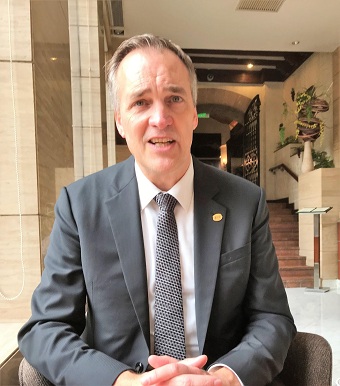SECURITY TODAY brings you an exclusive Interview with Mr. Godfried Hendriks, CPP, the 2019 President-Elect of ASIS International, the world’s preeminent body of security professionals.
Mr Hendriks is active in the field of security and crime prevention since 1989, specialising in retail security, retail robbery prevention, retail fraud prevention, retail cash management systems and public private partnerships.
It is a pleasure and honour to have this opportunity to interact with you informally. To begin, please tell us something about yourself.
I was born and brought up in the Netherlands, after graduating as a Mechanical Engineer I finished my Masters in Business Administration and was then pursuing my Doctor in Business Administration, which I did not finish, but would like to complete it someday. This disruption happened due to some business opportunities that came my way, which were so good, that I decided to postpone my DBA.
We understand that you will be the President of ASIS International soon. Congratulations! When does your term as President actually begin? Tell us something about your association with ASIS.
I became a member of ASIS International in 1992. I became a volunteer leader in the year 2002 when Mr. Eduard Emde (who was the first non-North American President of ASIS International in 2012) invited me to volunteer for a leadership role. At that time I became a member of the Benelux Chapter Board, so actually my journey as a leader started then. Later, I became the Assistant Regional Vice President (ARVP), then the Regional Vice President (RVP) and the Senior RVP (SRVP) before serving as the Global Co-Chair of the SRVP Group. I was elected as a member of the Board of Directors from 2014, and as 2017 Secretary and 2018 Treasurer. I am the 2019 President-Elect.
What is the current focus of ASIS International?
Our focus is to support the local regions and with that objective in view, we are organising ourselves better to fulfil that role. As you are aware, ASIS is a global organisation with more than 34000 members. Over the years it has created substantial professional resources for the private security industry that, if pooled together, can add tremendous value to our local chapters, who can then make a big difference to the society. But, all this has to be organised well, if we are to achieve our goal.
How many regions / chapters does ASIS have and how do you view India?
We have 245 chapters in 51 regions. In this part of the world, we have the East and the West Asian regions and then we have Oceania, comprising of Australia and New Zealand. Considering the rapid development of the Indian economy for us India is significant to focus on, even more than China. We would like to support India, the best that we can in order to grow the local membership and professional activities.
How about Europe?
Europe is also an important region for us. It has 27 chapters there with a sizeable membership base. There we also track EU legislation and making our members aware of them. You see, the focus of our activities differs from region to region.
But, one thing I can say, ASIS is strongly focusing on developing future Security Leaders from amongst the pool of younger members through education and mentoring.
What is your view about India?
This is my first visit to India and in must confess that I’m suitably impressed with the quality of people that I’ve met at the recent conference that I attended. I liked the facilities here, your airport is very efficient, as I went through immigration in 5 minutes when I landed. With 1.3B people, India is actually like a continent, I think there is great potential for ASIS to grow here. The quality of security professionals and their understanding about security and their enthusiasm to learn more is amazing.
How important is it for security professionals to be educated and certified?
Very important. As risks become complex, security professionals will have to keep on investing in their self development and learning to keep abreast of the rapid changes taking place all around.
Acquiring ASIS professional certifications like the CPP, can be expensive, especially when some employers don’t even reimburse the annual ASIS membership fee to their employees.
Well, I would say it’s dumb of the employers not to pay for the development of deserving security personnel. It reminds me of the quote, where the HR head questioned the CEO and asked, “What if we invest in the training of our people and they leave?” And the CEO replied, “What of we don’t and they stay!”
What is the role of the RVPs and the ARVPs?
Well the official structure is like this. The ASIS International Treasurer works with the Sr. RVPs, and we have 15 of them globally for every region. The Sr. RVPs then work with RVPs and the RVPs work with ARVPs. So basically, the role of the RVP is to support the chapters in their region by identifying new opportunities for them and helping them grow. In addition to the above structure, we have a Young Professionals and a Women in Security liaison resource as well, since these are gaining importance. The Sr RVPs, the RVPs and the ARVPs are appointed and have a tenure of a maximum of two terms of three years each. They then have to be succeeded by newer professionals willing to serve in that role. However, in the future we may have elected Regional Boards to fulfill these functions, as this process will be more transparent and democratic.
What are your expectations from the Indian Chapters?
I am very optimistic about India. Now that we have reduced the fee for annual membership from US$150 per annum to US$75, where the member gets to read the Security Management monthly magazine online instead of getting the hard copy via airmail. This has been done for emerging markets of the world, so as to encourage more professionals to become members. So, I see a good potential for the ASIS chapters in India to grow from here onwards. While I was the Global Co-Chair, we separated India and Pakistan into different regions, previously they were in one, an arrangement that was not working out well.
Now, that you’ve been to India and have had the opportunity to attend the CSO Leadership Summit, what do you think about the level of professional understanding of the people participating in the seminar?
I think that the people attending the event to be above average senior security professionals and I am very much impressed with their knowledge and level of expertise. I am even impressed with the quality of the presentations, some of them can be compared with those that are given at such gatherings in Europe and elsewhere. Having said that, since I have not had the opportunity to interact with people at lower levels, such as security guards, I would not be able to comment on their levels of training and understanding.
It’s been a pleasure to have interacted with you and thank you for this opportunity, hope to see you again soon in India
Thank you, it’s also been a pleasure for me to be speaking with you. Next time, I might be visiting India with my wife for a holiday.








